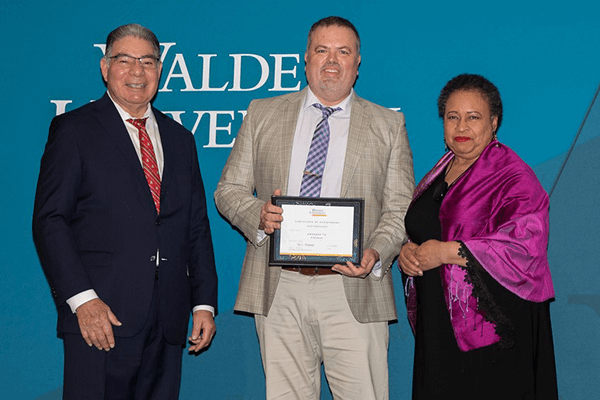Daredevil, Batgirl, and Sports Guy have a message to share: They are not their disabilities; they are complex people. They also have insights that might surprise policymakers about how—and especially when—to help them improve their lives.
Each was a research “collaborator” who chose a nickname and opened up about their lives through interviews and mixed media “comic books” in Dr. Eric Sarrett’s dissertation, “Narrative Inquiry into Postsecondary Transition Outcomes for Young Adults with Intellectual & Developmental Disabilities.”
“Narrative inquiry says we makes stories out of our life to give it meaning,” says Dr. Sarrett. “This research methodology places a lot of emphasis on the narrator rather than you trying to control their story.”
Giving them a voice revealed themes that surprised Dr. Sarrett and have implications for everyone working with and for this population.
Policy Cliffs and Adolescent Earthquakes
“The literature from parents and policy officials focuses on the ‘policy cliff’ and how disorienting and disruptive it is to graduate high school and lose access to special education services,” says Dr. Sarrett. “What I found is that for every one of them the trauma was going from grade school to middle school and adolescence.”
Bullying, sexuality, and loss of support as they transitioned from a single elementary school classroom to many in middle school were substantial challenges. It was one of many “adolescent earthquakes.”
“One story that almost brought me to tears during data collection was a person who never had a friend his entire life. He wanted friends, but he was bullied and picked on,” says Dr. Sarrett. “At 26 he now has a friend, and they go to the local gym and shoot basketball. Even with the most turbulent stories, the end of every narrative ended with hope for the future.”
Another overlooked theme was how strength-based their personal identities are. “We tend to view them as a disability first. But we all view ourselves through the interests we have and the things we’re good at,” says Dr. Sarrett. “They all talked about wanting to have a job and to help people. There was not a ‘taking’ mentality. I found their desire to give back very inspiring.”
An Evolving Path to a PhD
Five years ago, a PhD (and having a child while working toward it) were not on Dr. Sarrett’s radar. But as an occupational therapy faculty member at the University of St. Augustine for Health Sciences, he needed a terminal degree. While many of his colleagues pursued doctorates in rehabilitation, he chose Walden’s PhD in Public Policy and Administration as a way to differentiate himself.
“Policy is the ocean that raises or lowers all boats,” says Dr. Sarrett. “I was frustrated by policy changes that were hampering healthcare, such as Medicaid and Medicare restrictions and reimbursements. It’s easy to ignore it, but that doesn’t help.”
His dissertation evolved over time, starting with ideas about the impact of electronic documentation on clinical evaluations. But great advice at a Walden residency kept him open-minded: “Don’t come in with your topic formed. You need to read the literature and let it emerge.”
“I thought I would do a quantitative study. But there is so much quantitative data on this topic that it became clear that nobody is talking to this population,” he says. “When it finally came to me that we need them describing their experiences in their own words, I was so happy I literally jumped up and did a lap of the house, yelling ‘That’s it! That’s my topic!’”
After graduating, Dr. Sarrett wanted to share that excitement and heartfelt gratitude with high school teachers in his West Virginia hometown who helped him change the narrative of his life.
“At Christmas, I sent them a copy of my dissertation with a note and a special gift,” says Dr. Sarrett. “All these years, I wanted to give back and tell them that the interest they showed in me made a difference. A PhD is the pinnacle of education so what better opportunity?”
Dr. Eric Sarrett (center) receives the Harold L. Hodgkinson Award for Outstanding Dissertation from Walden board of directors member Dr. Stan Paz (left) and chair Toni Freeman (right).




